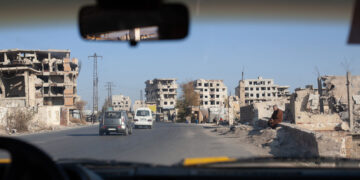Joost Hiltermann is the Program Director for the Middle East and North Africa at the International Crisis Group.
Revolutions can take decades to show their full transformative impact, but in the case of the Middle East and North Africa, the popular uprisings that coursed through the region beginning in late 2010 have failed to fulfil any of their early promises ten years on.
Instead, with the possible exception of Tunisia, they have only made things worse: several countries descended into chaos and civil war; in others, sitting regimes strengthened their hold on power or, suffering an initial defeat, returned with a vengeance, a brutal Tweedledum making way for a vicious Tweedledee.
In 2011, protesters flooded into the streets and squares calling for social justice, jobs, and an end to nepotism, state-sponsored bribery, and the daily indignities inflicted by a highly intrusive security apparatus. They wanted dramatically better governance and, failing that, the overthrow of unresponsive and corrupt regimes. Today, they have achieved none of their core objectives. While the uprisings saw the downfall of long-time autocrats in Tunisia, Egypt, Libya, and Yemen, social and economic conditions throughout the region remained largely unaltered, or grew worse.
Yet it would be premature to write off the uprisings as momentary spasms of popular discontent. Years from now, we may well come to see them as merely the starting shot for a profound social transformation, one that the region so sorely needs.
There are signs that what happened a decade ago was not a simple one-off. First, there is the occurrence in 2019-2020 of a new wave of mass protests – in Sudan, Algeria, Iraq, and Lebanon, all countries that the earlier storm had passed by. These underlined how popular grievances and demands are similar and pervasive throughout the region, and that people, lacking institutional means of political expression, are still ready to raucously raise their complaints and calls for change in public squares.
Then there is the fact that the surviving regimes have drawn all the wrong lessons from the experience. Instead of addressing people's legitimate grievances, they have doubled down on repression, entrenching their security states. Today, the same coercive, unaccountable, unresponsive regimes, or their carbon-copy successors, remain in charge, facing the selfsame economic and social challenges, possessing as few workable answers to these as before. The latest events in Tunisia, where people once again took to the streets, underline how the region's ruling elites and the outdated social contracts they uphold endure even in a country whose transition into a more open political system has been the region's only point of light, and how this may be prompting cycles of contestation.
It is difficult to see how this profound region-wide malaise can continue, for how much longer these near-comatose regimes can survive. They have no answers to the region's pressing problems of daunting complexity, and fail to allow for greater political participation that could produce fresh ideas and greater popular buy-in for what would otherwise be unbearable solutions. They seem incapable of any sort of reform, and are resistant to external inducements for positive change.
It is impossible to predict when the next implosion will come, or what will trigger it. Experience tells us it could be a relatively minor incident that serves as a spark, like the traffic collision that set off the first Palestinian intifada, the Tunisian street peddler's self-immolation a decade ago, or the brusque imposition of a tax on WhatsApp voice calls in Lebanon in 2019. Each could trigger a chain reaction. Autocrats' fear mongering or bribery – so effective in 2011 and since – may work again, or may not. The barrier of fear may have been broken. And a low oil price is draining the coffers of the wealthy Gulf states that have a stake in their own and most other Arab regimes' survival.
External factors will play their part as well. Official Russia convinced itself that the United States had orchestrated the Tahrir protests that ousted Hosni Mubarak, or – in a less uncharitable interpretation that is closer to the truth – that it allowed the regime to fall, and that it thus bore responsibility for the dramatic changes that swept the region. Moscow has been unequivocal in its desire to see the Arab state order undisturbed or restored, backing Sisi in Egypt, Assad in Syria, and Haftar in Libya. The Russian leadership fears the demonstration effect at home of U.S.-led regime-change efforts in eastern Europe and the MENA region. It will likely do whatever is in its power to prevent another similar threat to its vested interests.
As for America and Europe, Western governments and media viewed the popular uprisings as pointing to a deep desire on the part of many Arabs, especially the youth, for change – as expressions of hope. But when events took a turn for the worse, old fears re-emerged, and governments started tightening border controls against refugees and migrants, among whom they suspected were jihadists trying to get to Europe. In the end, European governments mostly reverted to their longstanding default approach toward the region, re-embracing the stability paradigm that had helped give rise to the uprisings in the first place, while exploring ways to encourage regimes to jettison their most repressive behavior. They are buying time, at most.
Throughout the Middle East and North Africa, the embers of discontent continue to smolder. There is no turning back to the pre-2011 era, however much the likes of a Sisi or Assad may be trying. Yet no one seems prepared for the next eruption, other than by bracing oneself and hoping for the best.
***
Photo: Algerian students hold placards on April 30, 2019 as they continue their weekly demonstrations in the capital, Algiers, to demand the overthrow of the system. (Photo by Billal Bensalem/NurPhoto via Getty Images)





































